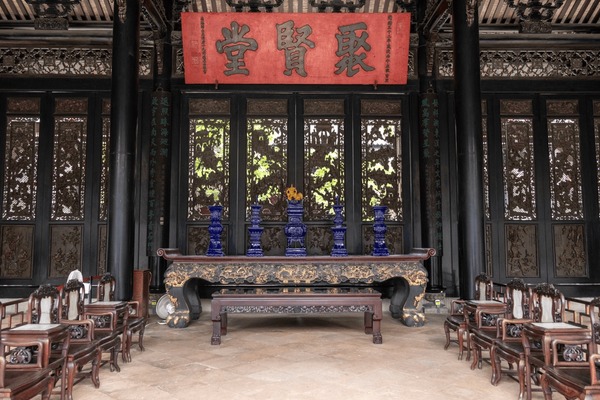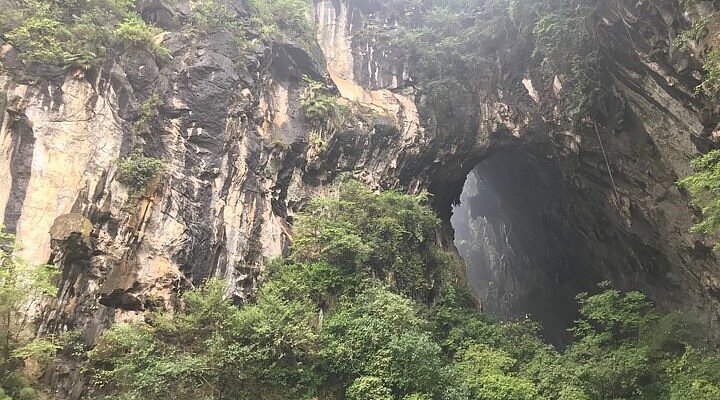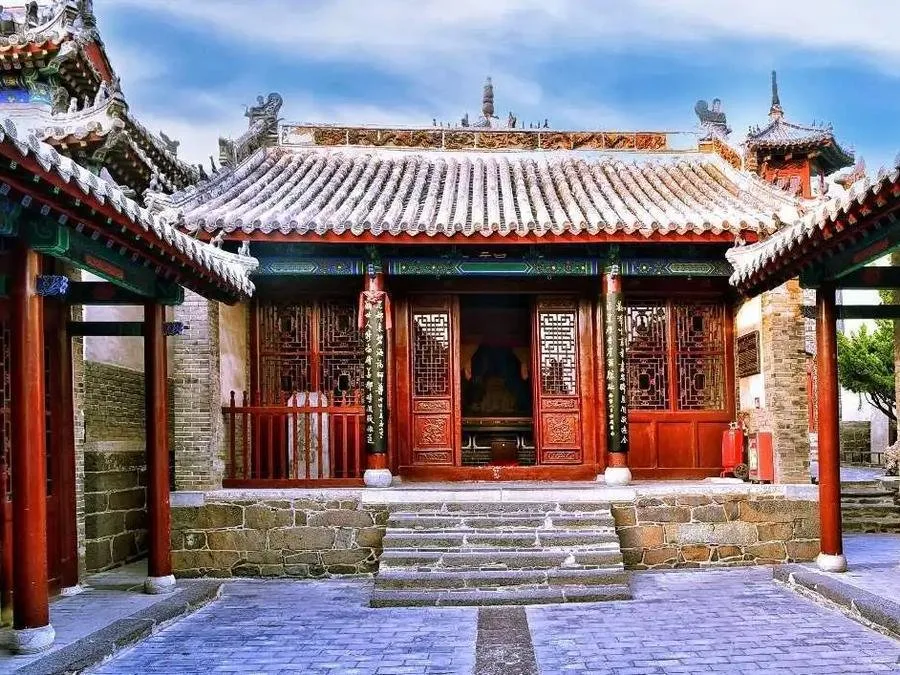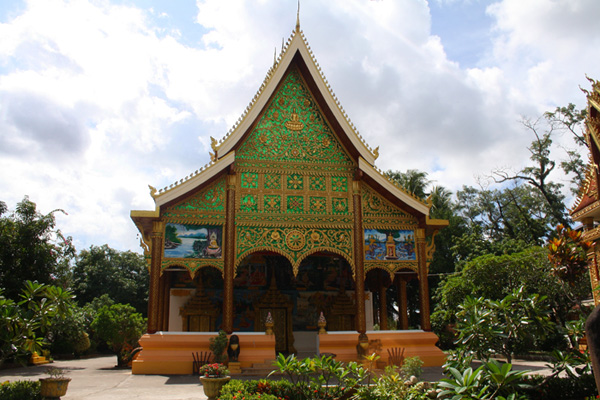Experience Tranquility at Peng Ancestral Temple: A Hidden Paradise

An Essential Guide to Visiting Peng Ancestral Temple
Nestled in the serene landscapes of Yingde, the Peng Ancestral Temple stands as a time-honored tribute to the rich heritage of the Peng family. This ancestral hall, steeped in history, captures the essence of traditional Chinese architecture and culture, making it a must-visit for international travelers seeking an authentic glimpse into the past. As you step inside, you’ll be greeted by intricately carved wooden beams and ancient relics that tell stories of generations gone by. The atmosphere is both peaceful and reflective, allowing visitors to immerse themselves in the legacy of the Peng clan.
Visiting the temple not only provides a visual feast of historical architecture but also offers a unique opportunity to engage with the local community. Friendly locals, including children who are eager to share tales about the temple’s significance, enhance your experience, making it a memorable part of your journey. Whether you’re an architecture enthusiast, a history buff, or simply looking for a tranquil escape, the Peng Ancestral Temple beckons with its charm and cultural significance. Don’t miss the chance to explore this hidden gem and discover the rich tapestry of Chinese ancestral worship.
In This Guide
- An Essential Guide to Visiting Peng Ancestral Temple
- The Rich History and Legends of Peng Ancestral Temple
- Main Highlights: What You Absolutely Can’t Miss
- Planning Your Visit: A Practical Guide
- Tickets: Prices, Booking, and Tips
- How to Get There: A Complete Transportation Guide
- Local Cuisine and Accommodation Nearby
- Frequently Asked Questions
- Final Thoughts on Your Trip
The Rich History and Legends of Peng Ancestral Temple
Nestled in the serene Huanghua Town of Yingde, the Peng Ancestral Temple serves as a poignant testament to the rich legacy of the Peng family, a lineage that has thrived for centuries in this region of Guangdong, China. This ancestral hall, known as 彭氏宗祠, is not merely a structure of stone and wood; it is a vibrant repository of history, culture, and the enduring spirit of a family that has played a significant role in the local heritage.
The temple’s origins can be traced back to the early dynasties, a time when ancestral halls became essential for the preservation of family lineage and traditions. The Peng family, like many others in China, established this hall as a place to honor their ancestors and maintain the values and teachings passed down through generations. Today, visitors can marvel at the intricate architecture that reflects traditional Chinese design, complete with ornate carvings and stunning woodwork, all of which have been meticulously preserved to showcase the artistry of the era.
Legends surrounding the Peng family add another layer of intrigue to this historical site. Tales of valor, wisdom, and benevolence are woven into the fabric of the Peng family’s narrative, reflecting their contributions to the community and the larger society. Stories shared by local children and elders often recount the family’s role in aiding the needy and fostering education, reinforcing the temple’s significance as a hub of moral and cultural guidance.
Visitors to the Peng Ancestral Temple are often captivated by the tranquil atmosphere and the breathtaking mountain views that surround the site. The temple not only offers a glimpse into the past but also serves as a stage for cultural events and family reunions, where descendants gather to honor their heritage. This connection to the present highlights the temple’s role as an enduring symbol of familial bonds and communal identity.
For international travelers seeking to immerse themselves in authentic Chinese culture, the Peng Ancestral Temple is a must-visit. Here, one can wander through hallowed halls, absorb the stories etched in its walls, and truly appreciate the deep respect for ancestry that continues to thrive among the Peng family and their community. Whether you are an admirer of architecture, a history enthusiast, or simply in search of a peaceful retreat, the temple offers a rich experience that resonates well beyond its physical boundaries.

Peng Ancestral Temple.
Main Highlights: What You Absolutely Can’t Miss
Visiting the Peng Ancestral Temple (彭氏宗祠) in Yingde is a journey into the rich tapestry of Chinese heritage and family legacy. Nestled amidst lush mountains, this ancestral hall is not just a historical site; it’s a vibrant cultural hub that brings the legacy of the Peng family to life. Here are the key highlights that you absolutely cannot miss during your visit:
Architectural Marvel
The temple boasts stunning traditional Chinese architecture, complete with intricate wood carvings and elegant stonework. As you stroll through its halls, take a moment to admire the craftsmanship that reflects centuries of tradition. The layout of the temple, with its harmonious balance of courtyards and pavilions, enhances the serene atmosphere, inviting visitors to reflect on the significance of ancestral worship.
Historical Significance
The Peng Ancestral Temple serves as a testament to the deep-rooted familial values in Chinese culture. It is dedicated to honoring the ancestors of the Peng family, offering a glimpse into their history and contributions. Engaging with the stories shared by local guides or even enthusiastic children eager to recount the temple’s tales allows visitors to connect with the past in a meaningful way.
Spiritual Experience
Many visitors describe a sense of tranquility when inside the temple. It’s a place of worship and reflection, where you can witness traditional rites and ceremonies that are still practiced today. Whether you observe the burning of incense or participate in small rituals, this spiritual dimension adds depth to your visit, making it more than just a sightseeing stop.
Scenic Surroundings
Perched in a picturesque location, the temple offers breathtaking views of the surrounding mountains. Early morning visits are particularly magical, as the mist envelops the landscape, creating a mystical ambiance. Don’t forget your camera; the backdrop is perfect for capturing stunning photographs of both the temple and its natural surroundings.
Local Engagement
One of the highlights of visiting the Peng Ancestral Temple is the opportunity to engage with the local community. Many descendants of the Peng family still reside in the area, and their passion for preserving their heritage is palpable. This connection not only enriches your understanding of the temple’s significance but also fosters a deeper appreciation for the cultural values that bind the community together.
Accessibility
Conveniently located in Huanghua Town, the temple is easily accessible for travelers exploring Yingde. It operates daily from 8:00 AM to 5:30 PM, making it a perfect addition to your itinerary. Pair your visit with explorations of nearby attractions, such as the stunning Jinlong Cave or the scenic Kwan-yin Valley, to complete your cultural experience.
In summary, the Peng Ancestral Temple is a captivating destination that offers a blend of history, culture, and spirituality. Whether you’re an avid history buff or a casual traveler, this temple provides an enriching experience that will resonate long after your visit.

Peng Ancestral Temple.
Planning Your Visit: A Practical Guide
Visiting the Peng Ancestral Temple (彭氏宗祠) offers a unique glimpse into the rich heritage and history of the Peng family. Nestled in Huanghua Town, Yingde, this ancestral hall is not only a significant architectural site but also a cultural treasure. Here’s everything you need to know to plan your visit effectively.
Location and Getting There
The Peng Ancestral Temple is located in Huanghua Town, Yingde, Guangdong Province, China, with the postal code 513031. For international travelers, the nearest major city is Guangzhou, which is approximately 100 kilometers away.
Transportation Options:
– By Train: From Guangzhou, you can take a train to Yingde Railway Station. The journey takes around an hour. Once at the station, local taxis are available for a short ride to the temple.
– By Bus: Long-distance buses from Guangzhou to Yingde are frequent and affordable. The bus ride typically lasts about two hours.
– By Car: If you prefer driving, you can rent a car in Guangzhou and enjoy a scenic drive to Yingde.
Opening Hours
The temple is open to visitors every day from 8:00 AM to 5:30 PM. It is advisable to plan your visit in the morning when the weather is cooler and the lighting is perfect for photography.
Entry Fees
While specific ticket prices may vary, entry to the Peng Ancestral Temple is generally affordable. It’s best to check online or inquire at the entrance for the most current pricing.
What to Expect
The Peng Ancestral Temple is a beautifully preserved structure that showcases traditional Chinese architecture. Visitors can explore various halls that house artifacts and displays detailing the history of the Peng family. Engaging with local guides, often children from the community, can enhance your understanding of the narratives woven into the temple’s history.
Highlights of Your Visit:
– Architectural Beauty: Marvel at the intricate carvings and traditional design that reflect centuries of craftsmanship.
– Cultural Insight: Learn about the rituals and customs associated with ancestral worship, a core aspect of Chinese culture.
– Scenic Views: The temple is surrounded by stunning landscapes, making it an excellent spot for photography and relaxation.
Nearby Attractions
Consider extending your visit to explore other nearby attractions:
– Jinlong Cave: A fascinating natural cave known for its stunning geological formations.
– Kwan-yin Valley: Perfect for nature lovers, offering serene hiking trails and picturesque views.
Dining and Accommodation
If you plan to spend more than a day in the area, consider dining at local restaurants like Youduud Restaurant, which is about 1.4 miles from the temple, known for its authentic Chinese cuisine. For overnight stays, Yingde has various hotels and guesthouses that cater to different budgets.
Tips for International Travelers
- Language: While Mandarin is primarily spoken, some locals may understand basic English. It’s helpful to learn a few key phrases in Mandarin.
- Cash: While larger establishments may accept cards, it’s advisable to carry cash for small purchases, especially in rural areas.
- Respect Local Customs: As this is a place of cultural significance, be respectful when taking photos and observing rituals.
Visiting the Peng Ancestral Temple is not just a journey into the past; it’s an opportunity to connect with China’s rich cultural tapestry. With this guide in hand, you’re well-equipped to make the most of your visit. Enjoy your exploration!

Peng Ancestral Temple.
Tickets: Prices, Booking, and Tips
When planning your visit to the Peng Ancestral Temple (彭氏宗祠) in Yingde, Guangdong, it’s essential to be informed about ticket prices, booking options, and helpful tips to enhance your experience.
Ticket Prices
Admission to the Peng Ancestral Temple is quite affordable, allowing you to immerse yourself in the rich cultural heritage without breaking the bank. As of 2025, tickets typically range from approximately ¥20 to ¥30 (around $3 to $5 USD) per person. It’s advisable to check the latest prices before your visit, as they might vary during peak seasons or special events.
Booking Your Visit
While you can purchase tickets directly at the entrance, pre-booking is highly recommended during weekends and holidays to avoid long queues. You can book tickets online through various travel platforms such as Trip.com or directly from local tourism websites. These platforms often provide additional information, including any available discounts or special packages.
Opening Hours
The temple welcomes visitors daily from 8:00 AM to 5:30 PM. To make the most of your visit, consider arriving early in the morning when the site is less crowded and the weather is cooler. This timing also enhances the tranquil experience of exploring the ancient architecture and learning about the history of the Peng family.
Tips for Your Visit
-
Guided Tours: Consider joining a guided tour for a richer understanding of the temple’s history and significance. Local guides often share fascinating stories and insights that you might miss on your own.
-
Photography: The temple’s stunning architecture and serene gardens make it a perfect spot for photography. Be sure to bring your camera, but remember to be respectful of the cultural significance and avoid flash photography in sensitive areas.
-
Combine Visits: If time allows, explore nearby attractions like Jinlong Cave and Kwan-yin Valley, which are easily accessible and offer unique experiences in the beautiful Yingde area.
-
Respect the Culture: As this is a place of ancestral worship, it’s important to maintain a respectful demeanor during your visit. Dress modestly and adhere to any posted guidelines.
By keeping these details in mind, you’ll be well-prepared for a memorable visit to the Peng Ancestral Temple, where you can connect with the rich heritage and traditions of the Peng family. Enjoy your journey!
How to Get There: A Complete Transportation Guide
To reach the Peng Ancestral Temple (彭氏宗祠) in Yingde, Guangdong Province, international travelers can consider various modes of transportation, each offering a unique experience of the surrounding landscape and local culture. Here’s a comprehensive guide to help you navigate your journey:
Arriving by Air
Nearest Airport:
The closest major airport to Yingde is Guangzhou Baiyun International Airport (CAN), located approximately 120 kilometers from the Peng Ancestral Temple.
Getting from the Airport to Yingde:
1. Taxi: The most straightforward option is to take a taxi directly from the airport to the temple. The journey takes about 2 to 2.5 hours, depending on traffic. Ensure that the driver uses the meter or agree on a fare beforehand.
-
Airport Shuttle: There are shuttle buses that operate from the airport to Guangzhou city. From there, you can catch a train or bus to Yingde.
-
Train: Alternatively, you can take the metro from the airport to Guangzhou South Railway Station, then transfer to a high-speed train to Yingde. The high-speed journey takes around 30-40 minutes.
By Train
Train Stations in Yingde:
– Yingde Railway Station: This is the main station servicing the area. High-speed trains from major cities like Guangzhou and Shenzhen frequently arrive here.
Traveling from Guangzhou to Yingde:
– Board a high-speed train at Guangzhou South Railway Station. The trip to Yingde typically takes about 30-40 minutes. Once you arrive, you can take a taxi or local bus to the Peng Ancestral Temple.
By Bus
Long-Distance Buses:
– Buses from Guangzhou to Yingde are available at various bus stations, including Guangzhou Provincial Bus Station and Tianhe Bus Station. The journey takes around 2.5 to 3 hours, depending on traffic.
Local Transport in Yingde:
– Upon arrival in Yingde, you can take a local taxi or public bus to reach the Peng Ancestral Temple. The temple is located in Huanghua Town, approximately 30 minutes from the bus station.
Car Rentals
For those who prefer driving, car rentals are available at Guangzhou Baiyun International Airport and in the city. This option allows you to explore the beautiful countryside and other attractions at your leisure.
Local Transportation
Once in Yingde, transportation options include:
– Taxis: Widely available and relatively inexpensive, they provide a convenient way to reach the temple.
– Public Buses: A more budget-friendly option, although routes may be less straightforward for non-Chinese speakers.
Final Tips
- Language: English may not be widely spoken in this region, so having a translation app or a phrasebook can be helpful.
- Best Time to Visit: The temple is open from 8:00 AM to 5:30 PM daily, so plan your visit accordingly to make the most of your time.
- Cultural Respect: As a site of cultural significance, dress modestly and be respectful of local customs while visiting the temple.
With these transportation options, your journey to the Peng Ancestral Temple will be both manageable and enjoyable, allowing you to immerse yourself in the rich heritage of this historic site. Safe travels!

Peng Ancestral Temple.
Local Cuisine and Accommodation Nearby
When visiting the Peng Ancestral Temple in Yingde, not only can you immerse yourself in the rich history and architectural beauty of this ancestral hall, but you can also treat your taste buds to some local cuisine and find comfortable accommodations nearby.
Dining Options
Youduud Restaurant
Just a short drive away (approximately 1.4 miles), Youduud Restaurant offers a delightful introduction to traditional Chinese dishes. Known for its welcoming atmosphere and attentive service, the menu features a variety of local specialties, emphasizing fresh ingredients and authentic flavors. Whether you’re a fan of stir-fried vegetables, hearty soups, or succulent meats, you’ll find plenty to satisfy your cravings.
Accommodation
Yingde Karst Cave Hot Spring Resort
For a unique stay, consider booking a room at the Yingde Karst Cave Hot Spring Resort. Located close to the Peng Ancestral Temple, this resort combines luxurious accommodations with the natural beauty of the surrounding landscapes. After a day of exploring, you can unwind in their hot springs, which are a perfect way to relax and rejuvenate. The resort’s tranquil setting makes it an ideal spot for travelers looking to escape the hustle and bustle.
Local Guesthouses
If you’re interested in a more local experience, there are several cozy guesthouses scattered throughout Yingde. These establishments often provide a more intimate atmosphere, where you can interact with friendly hosts and get a glimpse of everyday life in the area. Many guesthouses offer home-cooked meals, giving you the chance to savor authentic regional flavors.
Exploring Further
While you’re in the area, don’t miss the chance to explore nearby attractions like the Jinlong Cave of Qingyuan and Kwan-yin Valley, both offering stunning natural sights and opportunities for adventure. After a day of sightseeing, returning to one of the recommended dining spots will enhance your experience, making your visit to the Peng Ancestral Temple truly memorable.
By blending cultural exploration with culinary delights and comfortable stays, your visit to Yingde can be both enriching and enjoyable.

Peng Ancestral Temple.
Frequently Asked Questions
Frequently Asked Questions about Peng Ancestral Temple (彭氏宗祠)
-
What are the opening hours of the Peng Ancestral Temple?
The temple is open daily from 8:00 AM to 5:30 PM. It’s best to visit in the morning to enjoy the serene atmosphere and the surrounding mountain views. -
Is there an admission fee to enter the temple?
Yes, there is usually a nominal entry fee. However, it’s advisable to check the latest information or any promotions before your visit. -
What can I expect to see at the Peng Ancestral Temple?
Visitors can explore the beautifully preserved ancestral hall, showcasing traditional architecture and artifacts. The temple also features informative displays about the Peng family history, making it a great spot for understanding local heritage. -
Are there guided tours available?
While the temple does not have formal guided tours, there are often local children or volunteers who are eager to share stories and insights about the temple’s history. Engaging with them can enhance your visit. -
How do I get to the Peng Ancestral Temple?
The temple is located in Huanghua Town, Yingde, Guangdong Province. You can reach it by taxi or local bus from nearby cities. If you’re driving, there is parking available on-site. -
Are there any nearby attractions to visit after the temple?
Yes, there are several attractions nearby, including Jinlong Cave and Kwan-yin Valley. Both are wonderful options for those looking to explore more of the natural beauty and cultural sites in the area. -
Is the temple accessible for visitors with mobility challenges?
The temple has some uneven surfaces and stairs which may pose challenges for those with mobility issues. It’s advisable to check in advance if specific accommodations are available. -
What is the best time of year to visit the Peng Ancestral Temple?
The best time to visit is during the spring (March to May) and autumn (September to November) months when the weather is mild. This allows for a comfortable exploration of the temple and its surroundings.
Final Thoughts on Your Trip
As your journey comes to an end at the Peng Ancestral Temple, take a moment to reflect on the rich tapestry of history and culture that envelops this remarkable site. Nestled in the serene landscapes of Yingde, this ancestral hall is more than just an architectural marvel; it’s a living testament to the traditions and values of the Peng family, passed down through generations.
Visitors often remark on the warm hospitality of the local community, including the enthusiastic children eager to share the stories of their ancestors. Such interactions provide a deeper understanding of the significance of this temple, where ancient customs are preserved amidst the natural beauty that surrounds it. Whether you were captivated by the intricate carvings or moved by the stories of heritage, your visit here is sure to leave an indelible mark on your travel experience.
As you leave the Peng Ancestral Temple, carry with you the lessons of history, the beauty of connection, and perhaps a newfound appreciation for the intricate web of family and culture that binds us all. Let this experience inspire your future travels, encouraging you to seek out the stories hidden in every corner of the world. Safe travels on your next adventure!